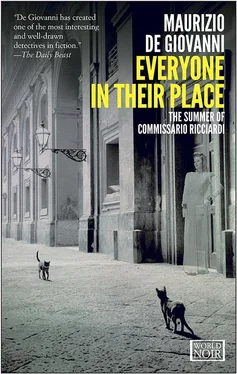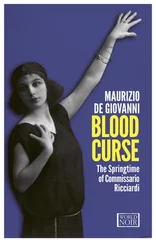Maurizio de Giovanni - Everyone in Their Place
Здесь есть возможность читать онлайн «Maurizio de Giovanni - Everyone in Their Place» весь текст электронной книги совершенно бесплатно (целиком полную версию без сокращений). В некоторых случаях можно слушать аудио, скачать через торрент в формате fb2 и присутствует краткое содержание. Жанр: Исторический детектив, Полицейский детектив, на английском языке. Описание произведения, (предисловие) а так же отзывы посетителей доступны на портале библиотеки ЛибКат.
- Название:Everyone in Their Place
- Автор:
- Жанр:
- Год:неизвестен
- ISBN:нет данных
- Рейтинг книги:4 / 5. Голосов: 1
-
Избранное:Добавить в избранное
- Отзывы:
-
Ваша оценка:
- 80
- 1
- 2
- 3
- 4
- 5
Everyone in Their Place: краткое содержание, описание и аннотация
Предлагаем к чтению аннотацию, описание, краткое содержание или предисловие (зависит от того, что написал сам автор книги «Everyone in Their Place»). Если вы не нашли необходимую информацию о книге — напишите в комментариях, мы постараемся отыскать её.
Everyone in Their Place — читать онлайн бесплатно полную книгу (весь текст) целиком
Ниже представлен текст книги, разбитый по страницам. Система сохранения места последней прочитанной страницы, позволяет с удобством читать онлайн бесплатно книгу «Everyone in Their Place», без необходимости каждый раз заново искать на чём Вы остановились. Поставьте закладку, и сможете в любой момент перейти на страницу, на которой закончили чтение.
Интервал:
Закладка:
That was why he continued to stay far away from her, why he never looked for an opportunity to meet her, to be able to talk to her, look her in the eye, hold her hand. That’s the way it had been for over a year, until fate finally put them face to face. And now that pure, sweet emotion, experienced from a safe distance, had been tainted with the scent of flesh. For twenty-three hours a day, Ricciardi wished that the previous situation of checkmate could be reinstated; unsatisfying though it certainly might have been, it was at least reassuring.
But for an hour a day, for that hour, on the other hand, he’d have gladly flown the twenty-five feet that separated them to embrace her and kiss her a thousand times. And now that hour had arrived.
With his heart in his throat, after closing his bedroom door, Ricciardi went over to the window.
Enrica was distraught with rage and despair. A trap had been laid for her, without even asking her views or opinions. She’d tried all night long to catch her father’s eye, but he’d taken great care to look anywhere but at his daughter’s face. As for her mother, of course, she was perfectly at her ease in her role as the lady of the house, never stopping once as she regaled her guests with Enrica’s domestic gifts.
She had found her father’s two friends intolerable, a badly matched couple in which the wife was an unctuous, bullying harridan while the husband was a miserable wretch without qualities, practically a mute. As for the son, he was the main reason for her rage. An unpleasant, ignorant, uninteresting man; he knew how to talk-and never stopped for an instant-about nothing but clothing, automobiles, and high society, topics that could not have been any further from her interest.
It had been her mother, of that much she was sure. She had decided to go on the offensive, after whining for years about how urgent it was to find her a fiancé. She had become increasingly insistent, but Enrica never thought that she would stoop so low: to bring a man home, and without even asking! Her upbringing and her social standing kept her from being openly rude, but no one could force her to be pleasant. And so she had remained silent throughout the meal, for once served in grand gala in the drawing room; the hours went by slowly, with the incessant chitchat of that prettified dandy in her ears, and she was forced to tolerate her mother’s continual invitations to take part in the conversation and the harridan’s compliments, why, what a lovely young woman, what lovely hands, what a lovely smile. She was nauseated.
And now she was also desperate, because it was already ten o’clock and the guests showed no signs of leaving. And she wouldn’t be at the window to see the only man she wanted to listen to, if only he would say something to her.
Ricciardi had spent half an hour watching the darkened kitchen window, waiting in vain. The sense of disappointment had grown within him, along with some slight concern for Enrica’s well-being; he’d been certain that she would never miss their appointment except for some serious reason, some disaster, and it pained him not to know.
Just as he was about to give up and go to bed, he glimpsed out of the corner of his eye a gleam of light from the corner of the apartment building across the way: another room in the Colombo home had its lights turned on. There was a part of him that recoiled at the thought that he wanted to see who was there and what was going on, intruding into another family’s life like the lowest and most common gossip: but the other part of him easily won the battle.
Justifying his actions with the thought that he was only trying to ensure that Enrica was well and safe, he rapidly calculated just which window in his apartment would offer the best view of the illuminated room, and to his horror he realized that would be his tata ’s bedroom.
Rosa was just about to go to bed, having completed her rosary with the invocations of the proper saints. She had a nightcap on her head, her hair gathered inside it, a long nightshirt, buttoned from neck to feet, and she was pulling up the bedclothes when she heard someone knocking at her bedroom door.
“Who is it?” she called out, absurdly.
“It’s me, who did you think it was? No one lives here but you and me,” said Ricciardi.
“What’s the matter, don’t you feel well?”
“Yes, I feel fine, don’t worry. I just want to see something from your window. Can I come in?”
“Of course, be my guest.”
And Rosa saw Ricciardi open the door; she saw him give her a guilty look; she saw him go over to the window, muttering something about having seen some suspicious activity in the street; she saw him stand for several long seconds with both hands gripping the windowsill, holding his breath; she saw him brace himself against the wall with one hand, as if he were about to faint; she heard him moan softly; she saw him turn, pale as death, biting his lip; and last of all, she saw him leave the room, shutting the door behind him, after saying, “It was nothing, nothing at all, I must have been mistaken. Buona notte .”
At that point Rosa got out of bed, slowly pushing the covers aside, and in her turn went over to the window; there she saw a certain young woman sitting primly on a sofa, as stiff as if she’d swallowed a broom, with a smiling well-dressed young man whispering into her ear.
At first, she was worried. But then she decided that the ice tends to melt faster if you light a nice hot fire underneath it.
And with a smile, she went back to bed.
XIV
The following morning, anyone crossing paths with Maione and Ricciardi, who were on their way to Palazzo Camparino to question the two dukes, would have failed to notice any substantial changes in the expressions of either one: the commissario, dark and silent; the brigadier, sweaty and angry. Actually, though, both their moods had deteriorated considerably.
Maione had had a nightmare. There was Lucia who was giving immense bowls of macaroni with ragu to the damned fruit vendor Ciruzzo, laughing and telling him that he needed to put some flesh on his bones, that he was far too skinny. Behind the closed door, but he could see her perfectly as you can only in dreams, Filomena was weeping, begging him to eat what she’d cooked for him and him alone; it was impossible to see what was in the bowl, but he could smell a celestial aroma. Maione, who the night before had put on a heroic show of a lack of appetite and had eaten only two peaches, in his dream continued to decline the offer, and sat there, suffering, watching the detested Di Stasio as he enjoyed his meal.
The nightmare had worsened both the brigadier’s hunger and his anger, and the next morning once again he’d tried to don his summer uniform, but without success; so now he was walking up the Via Medina apparently in the same black mood as the day before, but in reality, he was furious.
The dominant emotion in Ricciardi, on the other hand, was bafflement. He found himself in the presence of an entirely new emotion, and he had no idea how to deal with it.
Unlike Maione, he’d had no nightmares, but that was only because he hadn’t slept a wink all night long. The image of a smiling Enrica, with a stranger whispering sweet nothings in her ear, was tormenting him. The part of him that had insisted on keeping his distance, well aware of just how impossible it would be to have a normal relationship, now piped up loudly, reiterating its reasoning; but the commissario suspected and feared that it was too late in any case, and that thought terrified him in some way.
He contemplated with genuine fascination the emotion that had surged through him, its reverberations echoing in his chest all night long. A real, physical malaise: not mental, the way he’d always imagined it, the thousands of times that he’d heard dead people talk about it, whether they’d been murdered for love or had killed themselves for love. In reality, it was a stabbing pain behind his stomach, in some unspecified spot under his lungs, and it affected both his breathing and his intestines. A violent and enduring pain that, if you tried to think about anything else, would immediately snap your attention back and keep your thoughts from wandering.
Читать дальшеИнтервал:
Закладка:
Похожие книги на «Everyone in Their Place»
Представляем Вашему вниманию похожие книги на «Everyone in Their Place» списком для выбора. Мы отобрали схожую по названию и смыслу литературу в надежде предоставить читателям больше вариантов отыскать новые, интересные, ещё непрочитанные произведения.
Обсуждение, отзывы о книге «Everyone in Their Place» и просто собственные мнения читателей. Оставьте ваши комментарии, напишите, что Вы думаете о произведении, его смысле или главных героях. Укажите что конкретно понравилось, а что нет, и почему Вы так считаете.












